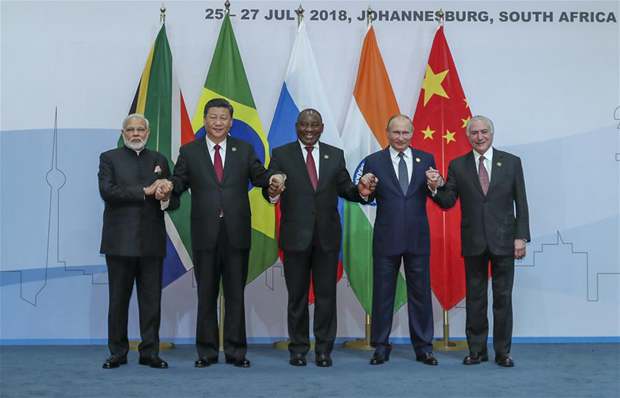The second golden decade of BRICS
- By Sajjad Malik
 0 Comment(s)
0 Comment(s) Print
Print E-mail China.org.cn, July 31, 2018
E-mail China.org.cn, July 31, 2018

The 10th BRICS summit was held in Johannesburg last week. The leaders from its member countries including Brazil, Russia, India, China and South Africa attended the important meeting that highlighted the beginning of the second decade of mutual cooperation.
The bloc represents the leading emerging market economies of the 21st century – the countries which are poised to play a crucial role in the world economic system in the coming decades. The objective of the summit was to discuss ways and means to forge a common development agenda to fast-track progress by addressing global challenges.
President Xi Jinping attended the summit, which shows his commitment to the idea of shared future development by enhancing closer cooperation with the international community. It also speaks volumes about his efforts for progress of Africa and its people.
Participation in the summit was the culmination of Xi's 11-day trip to different countries of Asia and Africa, including the United Arab Emirates (UAE), Senegal, Rwanda and South Africa. He also paid a brief friendly visit to Mauritius during a stopover.
The visit itself was historic due to several reasons. For example, it was the first visit of Xi and also the first by any Chinese head of state to UAE in 29 years and helped to push the bilateral relations to a new level. During his visit to Africa, documents were signed with Senegal and Rwanda for cooperation on the Belt and Road Initiative – a mega global initiative of connectivity and cooperation.
Foreign Minister Wang Yi said that it cemented the South-South cooperation and also opened up new vistas for the relationship between China and these countries. He said that the purpose of Xi's visit was to build a "community with a shared future for mankind."
Coming back to BRICS, the group has evolved into a key organization. In fact, it has come a long way since the first summit of BRIC was held in Russia in 2009. Later on, South Africa was invited to join and former South African President Jacob Zuma attended the third summit in China in 2011, as the group was transformed into BRICS.
The 2018 summit was a milestone for collaboration among the members. It symbolizes the end of a decade since the first summit as well as start of a new era of mutual development. The next ten years have been termed as a "Golden Decade" for BRICS cooperation.
President Xi mentioned the importance of the new age. While addressing the BRICS Business Forum at the summit, he said that the next decade will be crucial for global growth due to new drivers of economy entering the field and changes taking place in the sphere of the global governance system.
The key take away of Xi's speech is his unflinching support for globalization, while rejecting policies of unilateralism and protectionism that can result in global trade war and do a serious damage to international peace and stability.
"A trade war should be rejected, because there will be no winner. Economic hegemony is even more objectionable, as it will undermine the collective interests of the international community; those who pursue this course will only end up hurting themselves," said Xi.
Xi's speech is in consonance with the BRICS approach that is to "deepen, broaden and intensify relations within the grouping and among the individual countries for more sustainable, equitable and mutually beneficial development."
BRICS nations are conscious of a huge responsibility at the start of the golden decade. The Johannesburg summit witnessed a common desire for a partnership on the new industrial revolution. The declaration also affirms a desire to pursue a common developmental strategy and support of rule based international economic order.
The tectonic shift in the world economic and political system has increased the weight of BRICS and other such outfits. Analysts agree that Asian economies like China, India, South Korea, Japan and ASEAN will become dominant entities and slowly shift the balance by the middle of this century.
BRICS is poised to gain a lot when economic decision-making will move from its base in North America and Western Europe to new players like China, India, Russia and Brazil. These nations have huge untapped potential due to vast raw materials and manpower.
They need to exploit it in the "golden decade" of cooperation by enhancing their technical prowess. Innovation is the buzzword and BRICS provides a platform for pooling up expertise to further sharpen their competitive edge in the world of cut throat competition.
Sajjad Malik is a columnist with China.org.cn. For more information please visit:
http://www.china.org.cn/opinion/SajjadMalik.htm
Opinion articles reflect the views of their authors, not necessarily those of China.org.cn.






Go to Forum >>0 Comment(s)